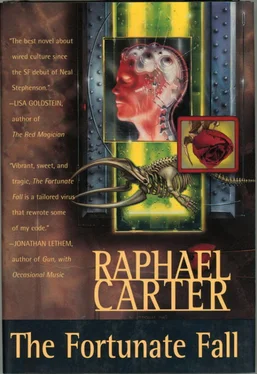Raphael Carter - The Fortunate Fall
Здесь есть возможность читать онлайн «Raphael Carter - The Fortunate Fall» весь текст электронной книги совершенно бесплатно (целиком полную версию без сокращений). В некоторых случаях можно слушать аудио, скачать через торрент в формате fb2 и присутствует краткое содержание. Город: New York, Год выпуска: 1996, ISBN: 1996, Издательство: Tor Books, Жанр: Киберпанк, на английском языке. Описание произведения, (предисловие) а так же отзывы посетителей доступны на портале библиотеки ЛибКат.
- Название:The Fortunate Fall
- Автор:
- Издательство:Tor Books
- Жанр:
- Год:1996
- Город:New York
- ISBN:0-312-86034-X
- Рейтинг книги:3 / 5. Голосов: 1
-
Избранное:Добавить в избранное
- Отзывы:
-
Ваша оценка:
- 60
- 1
- 2
- 3
- 4
- 5
The Fortunate Fall: краткое содержание, описание и аннотация
Предлагаем к чтению аннотацию, описание, краткое содержание или предисловие (зависит от того, что написал сам автор книги «The Fortunate Fall»). Если вы не нашли необходимую информацию о книге — напишите в комментариях, мы постараемся отыскать её.
“Gripping…. One of the most promising SF debuts in recent years”.
—“Publisher’s Weekly” starred review
The Fortunate Fall — читать онлайн бесплатно полную книгу (весь текст) целиком
Ниже представлен текст книги, разбитый по страницам. Система сохранения места последней прочитанной страницы, позволяет с удобством читать онлайн бесплатно книгу «The Fortunate Fall», без необходимости каждый раз заново искать на чём Вы остановились. Поставьте закладку, и сможете в любой момент перейти на страницу, на которой закончили чтение.
Интервал:
Закладка:
Then Keishi said something that made Voskresenye laugh and turn away.
What? What was that?
“Sorry, no way could I translate,” she said. “Some insults just don’t make sense unless you can specify a waveform with a single word.”
Voskresenye’s eyestalks swiveled toward me, and he spoke again.
“I’m sorry,” I said. “I don’t speak Sapir.”
“He asked you to confirm your Netname,” Keishi said.
“Oh. Umm, confirm(Maya, News One, camera),” I said, pleased to discover that in grayspace the palatal click for left-paren didn’t hurt my mouth. A pattern of colored lights appeared between us.
“Is it safe to say my pass phrase?” I asked Keishi.
“Yes,” she said. “I’ve got you covered.”
I had a moment of amusement when I realized she meant this literally. A million kilometers away, my body stirred and whispered: “Give up your past desires, and leave the poor world to its fate.” The colors rippled in response.
“Confirmed,” Voskresenye said, after a brief pause. “Gol an ix (KRIOL)?”
“I don’t speak native KRIOL either,” I admitted, feeling thoroughly outclassed. “Only interpreted.”
“Well, I can tell you one thing,” Keishi said. “He speaks a very high-class KRIOL. Judging by the number of parentheses he elides, he’s been talking to computers that could parse Russian if they felt like it. He split the verb from its argument, too, and he used the pronoun ‘ix’ without a restrictive definition. He’s been talking to AIs; I’d bet on it.”
Thanks, I said. I wasn’t sure what use the information was, but better to have Keishi feeding me trivia than heckling Voskresenye.
To my relief, Voskresenye switched to Russian. “Even so,” he said, in a tone of pleased surprise, “you speak KRIOL. How quaint. Nothing has quite the appeal of a dead language; it’s no accident that most of the world’s great religions have been conducted in them.”
“KRIOL isn’t dead,” I said.
“Not in Russia,” he said dismissively. “It is in Africa, where it matters.”
I seemed to have completely lost control of the conversation. To gain time I said—not very originally—“You are Pavel Voskresenye?”
“Yes,” he said. “And I know who you are. So, the formalities being over, you may now proceed to the jugular, if you can find one.”
“Don’t you love it when your reputation precedes you?” Keishi whispered in my ear.
“I wasn’t thinking of you as an opponent, Pavel Sergeyevich,” I said. “Why are you treating me like one?”
“I have lived a long life,” he said, “and I have made so many friends and so many enemies that I can no longer remember which is which. So I treat everyone as an enemy. It saves memory which can be used to better purpose.”
I blinked. Lucky that Keishi had changed my interface, or I would have had to wait for him to reappear. “And why grayspace?”
“As I’ve explained, I have many enemies. Grayspace is not secure, not anymore, but it is more secure than vidphones; if someone happens to be listening in, it should be relatively easy to detect him.”
“So ask him what he’s got to hide,” Keishi prompted.
I had been about to do just that. I nearly changed plans out of annoyance with her; but no, she would take that as a triumph. “Anything you say to me is going to wind up all over the Net, one way or another,” I said. “What’s the danger?”
“The danger, Maya Tatyanichna, is that if I tell something to a camera, the obvious way to prevent its becoming common knowledge is to kill both that camera and me before the Netcast can begin. Once the information is already on the Net, of course, that solution is useless. One must still fear revenge, but revenge is a less powerful motive than necessity.”
“I see.” I paused as if considering this closely, and subvoked: Keishi, just for fun, see if there’s a psychiatric record on this man.
“There’s not,” she said. “Which isn’t to say that there shouldn’t be, but there isn’t.”
Well, it was worth a try. Aloud I said: “We somehow skipped the part of this conversation where I tell you why I’m here, and I think you’ve gotten the wrong impression. All I want to do is ask you a few questions about the Calinshchina. I don’t see why there should be anything sensitive about that. It’s part of a series that’s been on News One for two weeks already. If someone wanted it suppressed, wouldn’t they have done it by now?”
“Asking questions about the Calinshchina,” he said, “is like pulling on a tangler’s web. You can pull them all day and find nothing. But if you choose the wrong one, you never know what sort of twitching horror you may bring to light.”
“I see,” I said, again. Voskresenye had a knack for crafting answers that frustrated all my follow-ups; I couldn’t pursue the question without risking the attention of a Weaver. I went to a canned question:
“In your book you give hundreds of survivors’ stories, but you leave out your own. Why? Which Square Mile did you survive?”
“I was imprisoned at Arkhangelsk,” he said, and even in gray-space, where there are no facial expressions, I could sense bitterness tinged with amusement. “Whether I survived is a matter of some debate.”
“What do you mean by that?”
He paused, then replied ironically: “What records there are insist no one survived Arkhangelsk. I have allowed the misconception to persist. I would not wish to diminish Mr. Calin’s crime by subtracting even one death from his body count.”
It was another of his slantwise evasions. Yet I could feel myself warming to him, and if I did, so would the audience. I decided to consider this a screen test, and not worry about pinning him down. Later I’d go over the disk, analyze his strategies, and develop a response.
“There is no disk, remember?” Keishi whispered. “If you want to put your camera chip in—”
Forget it, I subvoked flatly. Record this yourself, if you want.
To Voskresenye I said, “Wouldn’t you rather tell people about the millions who died, instead of just adding one to the ranks of the forgotten?”
“Naturally.” His tone was nonchalant.
“Pavel Voskresenye, why don’t we remember?”
The stormcloud that hung above our heads shifted uneasily. “That is a question that wants answering in a dark place where no one can listen, with all the chips out of our heads. Will you meet with me?”
“I was going to ask the same thing,” I said, and added to Keishi: but not for the same reasons. “ Where do you live?”
“Meet me at noon tomorrow on Nevsky Prospect, in front of the Bronze Horseman.”
I frowned. “I’d rather record you on your own turf. In your home, if possible.” I hate doing interviews in public places; it’s not fair to the screener to make her edit out gawkers. Then, too, a house is an extension of the self—a shell the soul secretes; like faces, they leak information.
“Perhaps later,” he said. “For now, the Horseman. I must ask that you come alone, and isolated from the Net. You may have an encrypted channel to your screener—I have just given her the specifications—but no more. Bring a vehicle; I will direct you to the site of the interview from there.”
“You’re maybe taking her to the Batcave?” Keishi said. “You want I should blindfold her?”
Keishi, behave!
“It is a most ill-mannered elephant.”
“She’s a loaner. My real screener’s in the shop.” I had been about to ask him for a different meeting place, but after Keishi’s outburst, it seemed petty to press the issue. “How will I recognize you?” I asked.
Читать дальшеИнтервал:
Закладка:
Похожие книги на «The Fortunate Fall»
Представляем Вашему вниманию похожие книги на «The Fortunate Fall» списком для выбора. Мы отобрали схожую по названию и смыслу литературу в надежде предоставить читателям больше вариантов отыскать новые, интересные, ещё непрочитанные произведения.
Обсуждение, отзывы о книге «The Fortunate Fall» и просто собственные мнения читателей. Оставьте ваши комментарии, напишите, что Вы думаете о произведении, его смысле или главных героях. Укажите что конкретно понравилось, а что нет, и почему Вы так считаете.












